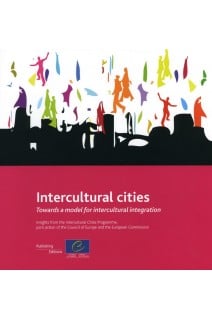



Intercultural cities introduces a new model of local governance and policy in the age of diversity: the model of intercultural integration.This model has been built on the basis of experience in real-life cities and with their active participation. City-to-city mentoring and learning have played a key role in this process.This volume explains what intercultural integration means in practice: how it affects policies, governance and citizenship, public discourse, media relations, public services and the urban environment. It reviews the processes that facilitate the development of intercultural strategies and presents a wide range of examples, including the intercultural profiles of 11 cities across Europe.Intercultural integration adds another dimension to the management of culturally diverse populations, compared to previous models, in particular multiculturalism. In addition to non-discrimination, equal opportunities and cultural rights, interculturalism focuses on building trust and cohesion by encouraging interaction and mixing between cultural groups in the public realm and encouraging a positive discourse and attitude to diversity within the community.It also focuses on improving the efficiency of public services by making them more culturally sensitive and adapted to the needs of diverse users, and on the need for specific services such as those dealing with intercultural mediation and conflict prevention.
Foreword
The challenge
Background and rationale
Building an intercultural agenda for cities
Where did the Intercultural Cities concept originate?
People on the move
The demographic challenge for European cities
Different urban policy approaches to diversity
Rationale for the intercultural city
Preparing for an intercultural city strategy
Formulating an intercultural city strategy: the process
Questions underlying the intercultural strategy
Consultation and participation
Establishing partnerships and alliances
Public discourse and media ethics
Momentum and sustainability
Policy formation and influencing related areas
Progress review and learning
10 elements of an intercultural city strategy
Examples of intercultural approaches in European cities
Reality check
Indicators for an intercultural city
Objective factors
Subjective factors
Pilot intercultural cities
Izhevsk
Lublin
Lyon
Melitopol
Neuchatel
Neukölln
Oslo
Patras
Reggio Emilia
Subotica
Tilburg
Evidence of success
Main actions and achievements
Main outputs
Main activities
Other actions of the programme
Conclusion
Télécharger un extrait (1000)

Intercultural cities introduces a new model of local governance and policy in the age of diversity: the model of intercultural integration.This model has been built on the basis of experience in real-life cities and with their active participation. City-to-city mentoring and learning have played a key role in this process.This volume explains what intercultural integration means in practice: how it affects policies, governance and citizenship, public discourse, media relations, public services and the urban environment. It reviews the processes that facilitate the development of intercultural strategies and presents a wide range of examples, including the intercultural profiles of 11 cities across Europe.Intercultural integration adds another dimension to the management of culturally diverse populations, compared to previous models, in particular multiculturalism. In addition to non-discrimination, equal opportunities and cultural rights, interculturalism focuses on building trust and cohesion by encouraging interaction and mixing between cultural groups in the public realm and encouraging a positive discourse and attitude to diversity within the community.It also focuses on improving the efficiency of public services by making them more culturally sensitive and adapted to the needs of diverse users, and on the need for specific services such as those dealing with intercultural mediation and conflict prevention.
Attention, en vertu de nos conditions générales de vente, l'achat des PDF/epub est réservé aux particuliers.
